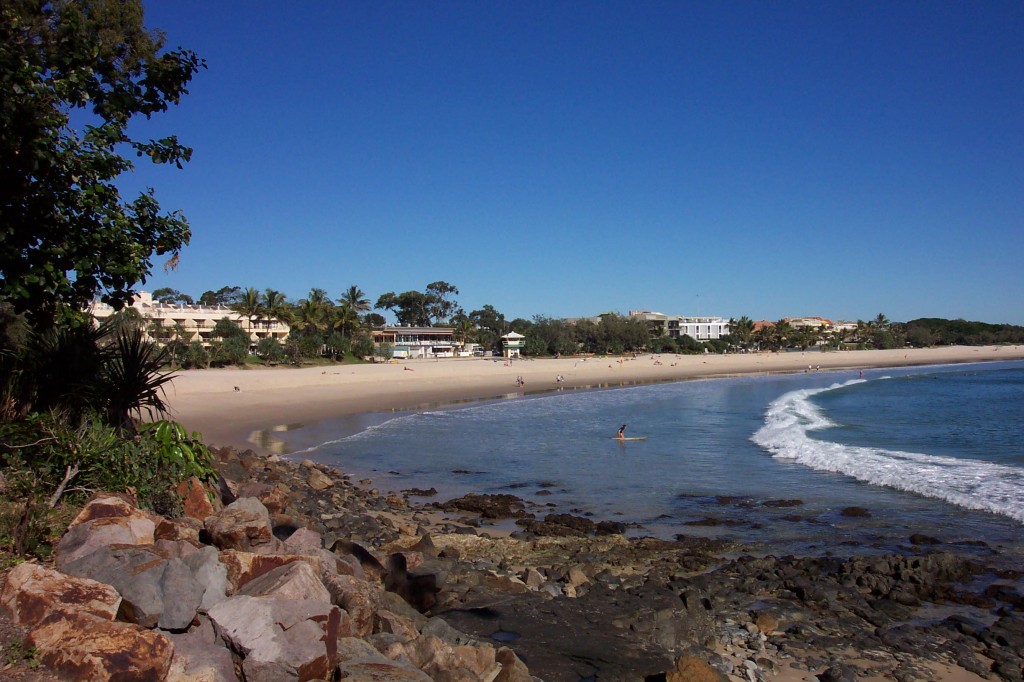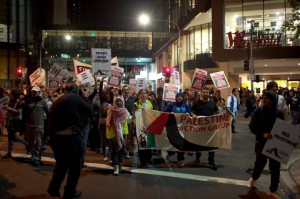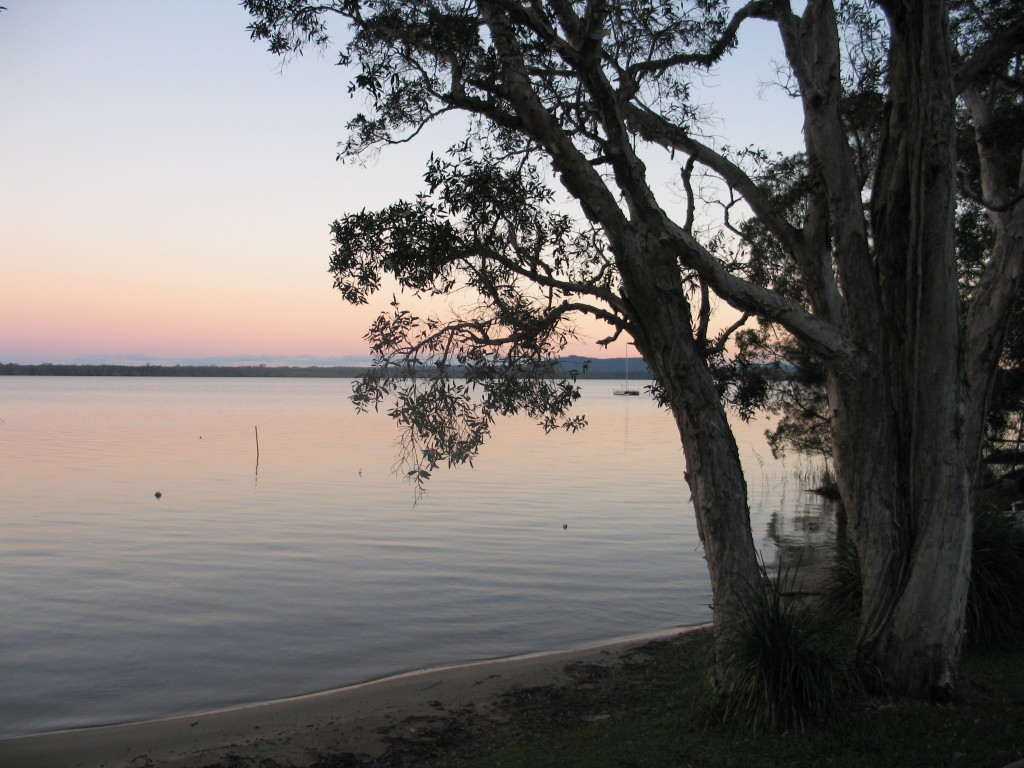Phil Monsour sings at an Adelaide Seacret protest on the 21st September, 2012 prior to the BDS (Boycott, Divestment and Sanctions) weekend seminar.
Free Noosa – De-amalgamate!
 The Free Noosa submission for de-amalgamation is now available – it is sustainable, green, sensible and financial!
The Free Noosa submission for de-amalgamation is now available – it is sustainable, green, sensible and financial!
Here’s my poem inspired by our community’s principled move toward de-amalgamation.
De-Amalgamation, At Last
Since the last election,
Oh Blight of all our lives,
the developers lament
for she was their delight.
Devine Homes perched upon the Board
which pulled our grassroots out,
Has she learnt her lesson?
The people showed their clout.
Who wants concrete wall to wall
as far as eye can see,
Who wins the real benefit?
not our community.
She thought of what to sell
We knew her plot too well
She and those dirty mates
wouldn’t share our living hell.
Where she saw dollars we see sense,
the rich gobble their swill at our expense,
when all we wanted
was to present pristine
environment in perpetuity,
sustainable and green.
What use covetous sanctimony,
preaching economic productivity?
In the dark with greedy mates
they signed away our dear shire’s fate,
stole our savings and overrated
was that the plan when she amalgamated?
Is it true democracy
that promotes developers’ profligacy?
Privatising neoliberalism
seems to lack a solid vision,
hollow perish or populate
with rabbit warrens all over the state,
since when was overpopulation
any habitat’s salvation?
She slunk away and we prevailed
She wouldn’t listen to our tale,
‘We must have progress’
she sighed and bleated,
too late, Blight,
you’re gone, unseated!
Ilan Pappé on the Apartheid Israeli Regime
Here’s the podcast of Ilan Pappé, interviewed by Geraldine Doogue on Radio National. Ilan is speaking at several engagements in Australia and appeared at the Festival of Dangerous Ideas in Sydney. He also appeared on Q and A. Accurately, Ilan stated: “Israel wants to remain a racist state and a democratic state – this is an oxymoron.”
Ilan Pappé on the National Press Club 19/9/12
Celebrated Israeli historian, Ilan Pappé whose landmark publication, “The Ethnic Cleansing of Palestine” documented the planned removal of 700,000 Palestinians from their lands in 1948, has written a new book “The Forgotten Palestinians”.
In the book, and at this September 16 community meeting at Sydney University, Pappé reveals the situation for the Palestinians who still live within Israel’s borders.
This was the first event of Professor Pappé’s 2012 Australian lecture tour. It was hosted by the Sydney Peace Foundation at the University of Sydney with the Coalition for Justice and Peace in Palestine and Leichhardt Friends of Hebron. Professor Pappé is in Australia as the guest of AFOPA to deliver the annual Edward Said Memorial Lecture at the University of Adelaide.
Ilan Pappé’s Melbourne address.
The two state solution is an hegemonic Israeli plan … to incorporate the West Bank. Its time has passed … Israel will ghettoise the West Bank. You have to decolonise the land, the people, to liberate them, it’s too early to talk about peace, you have to end oppression first. Only then can people can sit down and talk about what comes after the oppressive reality. The horse sees things differently from the rider, the rider does not see things in the same way.
The first but not the only way of convincing political elites that their way is the wrong way is pressure from the outside. BDS is part of what we should do, to send a political message that what Israel is doing is unacceptable. Constructive dialogue with Israeli Jews, educating them to see what life would be like after the oppression ends is important.
You need all ingredients to be in place, you won’t do it solely through BDS.
…
Oslo was oppression by other means.
UPDATE 28/9/12
Desegregating The Conflict: The History Of Collaborative Struggle In Palestine, Collaborative Struggle Conference, 24.09.2012 at the University of Woollongong
2012 ESML Presented By Ilan Pappe
UPDATE 23/9/12
Ilan Pappe responding to a a question 'I don't think Jews are the indigenous population of Palestine' #FODI
— Sydney Opera House Talks & Ideas (@IdeasattheHouse) September 23, 2012
Ilan Pappe says 'the only people who can give the Israelis the right to live in Palestine are Palestinians' #FODI
— Sydney Opera House Talks & Ideas (@IdeasattheHouse) September 23, 2012
Ilan Pappe says 'we all need better leaders, you too in Australia' #FODI
— Sydney Opera House Talks & Ideas (@IdeasattheHouse) September 23, 2012
Ilan Pappe says 'the fact that you're scared by uncertanties of a new reality doesn't mean you can stick with a cruel existing one' #FODI
— Sydney Opera House Talks & Ideas (@IdeasattheHouse) September 23, 2012
Ilan Pappe says 'don't ever fall for the Israeli propaganda that the Israel situation is so complex only Isrealis can understand it' #FODI
— Sydney Opera House Talks & Ideas (@IdeasattheHouse) September 23, 2012
Ilan Pappe says 'Israel Is An Apartheid State is not a dangerous idea, but words that describe a very dangerous reality' #FODI
— Sydney Opera House Talks & Ideas (@IdeasattheHouse) September 23, 2012
Ilan Pappe says 'not 1 new Palestinian settlement had been built since 1948, but over 500 Israeli settlements have been' #FODI
— Sydney Opera House Talks & Ideas (@IdeasattheHouse) September 23, 2012
Ilan Pappe says 'when Palestinian friends come to Tivon, they have no chance of being able to rent or buy a house' #FODI
— Sydney Opera House Talks & Ideas (@IdeasattheHouse) September 23, 2012
Ilan Pappe says 'in 1930s the Zionists considered ethnic cleansing of Palestinians' #FODI
— Sydney Opera House Talks & Ideas (@IdeasattheHouse) September 23, 2012
Notes from Middle East Reality Check on Ilan Pappé’s Festival of Dangerous Ideas address on the subject Israel Is an Apartheid State:
Is this a dangerous idea? Many Israelis wouldn’t think so. Nor South Africans. Nor many journalists and progressive folk in the West. Liberal Zionists though find it dangerous, and for many years have been trying to square the circle in an attempt to justify Israel’s apartheid policies. Jewish communities, of course, are allergic to the very idea. No, it’s not the recognition that Israel is an apartheid state that’s dangerous, it’s Israel itself that is dangerous; dangerous to Palestinians, dangerous to Jews in Israel and abroad, and dangerous to the world beyond.
Apartheid is a generic term for a legal, economic, social and political regime based on dispossession, discrimination and segregation on the basis of race, religion or nationality. The early Zionists, who were prolific diarists, described the Palestinians as dangerous aliens and usurpers. Their resistance to Zionist colonisation led the colonisers to develop apartheid policies of self-segregation and gated communities, which they forced on the native population once they’d become a ruling majority in 1948.
They institutionalised segregation, forcing on the Palestinian minority in Israel an invisible apartheid based on restricted living spaces, double standards in the courts and reduced access to state benefits. The Palestinian Israelis are confined to enclaves, with no new Arab towns being built since 1948. In contrast, hundreds of Jewish settlements have been constructed. In the West Bank, apartheid is starkly visible. Gaza of course is a world on its own, a large ghetto. How ironic that the people who most suffered from policies based on demography and population control in Europe should be dishing it out to others in Palestine.
Update 19/9/12:
Ilan Pappe likens Israel’s invasion of Palestine to Aboriginal dispossession
The premise of Terra Nullius, in which European settlers viewed Australia as an unoccupied space, is similar to the idea that the Palestinians willingly gave up their land.
Understanding and accepting this premise is one of the keys to reconciliation and forging a peaceful future, Professor Pappe says.
“Building reconciliation on the basis of these acknowledgments, understanding what kind of privilege you’re going to lose if you accept you are the dispossessor, and so many other issues that are really comparable. If you are an average Australian who accepts the basic narrative of what happened in Australia, the comparison is very clear.
“It is a problem of not accepting indigeneity, and claiming that it was either settled or disappeared or can be handled, instead of accepting it. Settlers and native people always have a complex relationship but the first step is acknowledging that this is the basic paradigm, the basic reality.”
Another historical comparison is that of apartheid South Africa, Professor Pappe says. Invoking the word “apartheid” is highly provocative; the term has legal implications as well as emotive ones, but he is resolute that the name is justified.
The ideology of apartheid – of separation, of segregation – is not dissimilar in the two countries, he says, arguing that Archbishop Desmond Tutu has also drawn the comparison between the two situations. “I don’t think it’s too strong a term. As a scholar I would like to go deeply into the comparison and see the similarities as well as the dissimilarities. But from the general perspective of what kind of attitude Jews have towards non-Jews in the state of Israel, I don’t know of a better term in a legal realm in that respect.”
South Africa did manage eventually to overcome the bitter policy of apartheid, and so too can Israel, Professor Pappe believes, but it must involve what he describes as “the three As”: acknowledgement, acceptance and accountability. Israeli, Jewish and Western acknowledgement that ethnic cleansing has occurred and that refugees want to return to their homeland; Israeli accountability for what has happened in the past; and an acceptance in the Arab world and among Palestinians that the Jewish nation is part of the Middle East.
It is not a completely hopeless prospect, he says, but accepts that it is very difficult for those with established standpoints to move beyond those and make a fundamental shift about how they view the problem before a solution can be found. And a solution is fundamental for the two nations, the region and the rest of the world.
“The future of Palestine is not just the future of Jews and Palestinians who live there, it’s the future of the relationship of the Arab and Muslim worlds with the west,” he said in an earlier lecture.
ABC Radio Conversation Hour with Jon Faine, Claire Bowditch & Greg Jericho Tuesday 18 Sep 2012
Related Links
Ilan Pappe in Australia at Coalition for Justice & Peace in Palestine (CJPP)
Radio National Breakfast makes Palestinians peripheral to their own dispossession, and invites zionist Morris to respond to Pappé
Danby’s petulant criticism of the ABC having Pappé on QandA
Successful BDS Protest at Max Brenner, Parramatta
 From the Palestine Action Group Sydney:
From the Palestine Action Group Sydney:
150 supporters of Palestine staged a rally in Parramatta in support of the global campaign of boycotts, divestment and sanctions against Israeli apartheid today. The protest was timed to also commemorate the massacres at the Sabra and Shatilla Palestinian refugee camps in Lebanon 30 years ago.
The Police had yesterday requested the Palestine Action Group cancel the event, but organisers decided to proceed as planned.
Demonstrators were addressed by South African activist Kolin Thumbadoo, who was president of the Anti-Apartheid Movement in Australia during the campaign against apartheid in South Africa.
In his speech Kolin stated, “As I was then, I am now, an implacable, unapologetic anti-racist. As I was opposed to a white minority regime in South Africa, so to am I opposed to a racist Zionist regime in occupied Palestine.”
The protest marched to the Max Brenner chocolate shop in Parramatta to highlight it’s connections with the Strauss Group, an Israeli corporation which publicly supports two of the most notorious brigades in the Israeli Defence Forces, the Golani and Gavati brigades.
“Just as in the struggle against Apartheid in South Africa, companies that support or profit from Israeli Apartheid should be boycotted,” said one of the protest organisers, Patrick Langosch.
The Palestine Action Group plans to hold more demonstrations in the future to continue to support the BDS campaign and the struggle of the Palestinians.
Related Links
Noosa Moves Toward De-Amalgamation

On another level however, this first step toward Noosa’s de-amalgamation from the Sunshine Coast Regional Council represents what a community can do from the grassroots to redress undemocratic wrongs – the forced amalgamation by the Blight government and theft of our successful shire’s money to prop up two unfinancial southern shires ravaged by Councils complicit with developers’ unsustainable greed.
NOOSA’S bid to separate from the Sunshine Coast Regional Council is one step closer to success.
Local Government Minister David Crisafulli announced this morning he would progress Noosa’s application for de-amalgamation to the Boundaries Commissioner for further consideration.
Noosa is only one of five successful applicants.
Nineteen former shires applied for de-amalgamation.
Boundaries Commissioner Col Meng and the Queensland Treasury Corporation will work together over the next two and half months to consider the cases for de-amalgamation.
“This was always going to be a difficult process but if a proposal stacks up, the community will make the final decision at a referendum,” he said.
Free Noosa chairman Noel Playford says he’s delighted that Noosa has made the cut, although not surprised.
“Let’s be honest, if our submission had not made it to the next stage, then nothing would.”
Mr Playford took Noosa’s 70-page submission and a petition of residents to the Minister’s office late last month.
He says the Boundaries Commissioner and his staff will soon be heading for Noosa to speak with local people and gauge for himself just how deep is the passion for de-amalgamation.
The former Noosa mayor said it was a once-only shot at breaking away from the “giant Sunshine Coast Regional Council”.
“For those who want to protect our balance of low-key development, lifestyle and natural beauty, we will probably never get another chance.”
Mr Playford has urged local people to make a brief statement to the Boundaries Commissioner on the issue.
“We need people to tell him what they think, why they want their council back. He’s read about the passion for independence in Noosa, but now he needs to see if for himself.”
The Noosa area – a UNESCO Biosphere Reserve – represents an environment on which we humans and the animal and plant species with whom we share a habitat rely. Having respect for the land on which we all depend means having respect for Indigenous values. Noosa will be protected through de-amalgamation – and our environmental and democratic values will prevail.
Participate in the online poll – vote for de-amalgamation of Noosa.
Take action against Israel’s theft of Palestinian land and homes at Silwan.
Related Links
“A Noosa businessman suggested to me the other day the SCRC is like a giant slug sucking the life out of Noosa. That may be a little over the top but you get the picture.”
Free Noosa
A Sustainable Australia
To vote or not to vote
In our Noosa garden
It’s a busted trike, not a Ferrari, Mr. Beattie